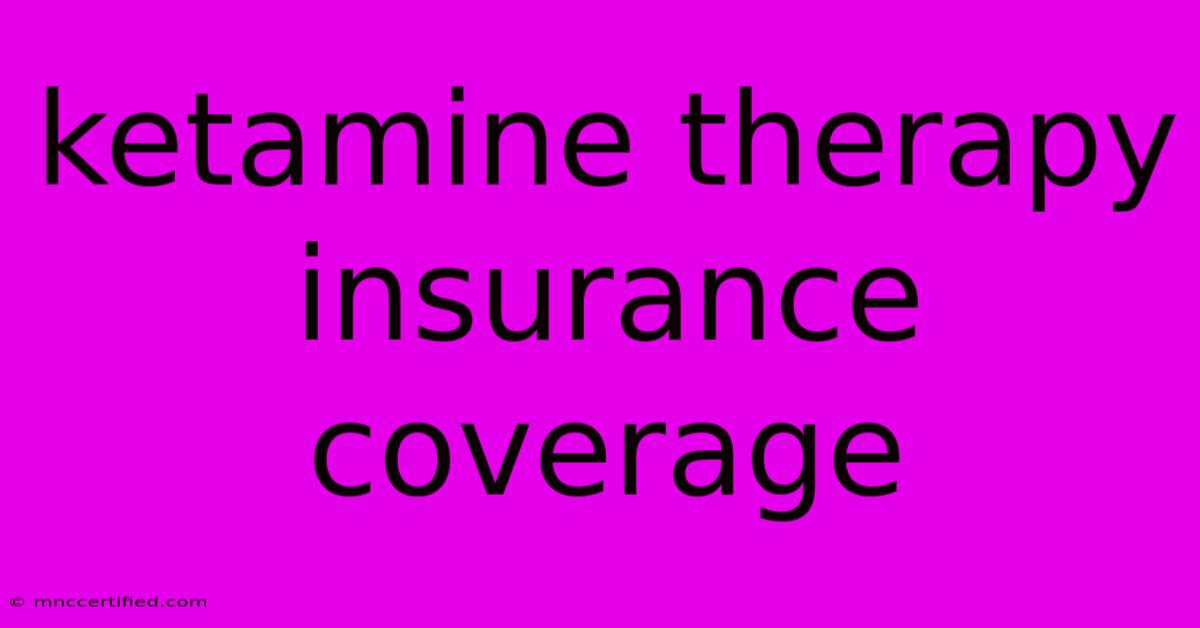Ketamine Therapy Insurance Coverage

Table of Contents
Navigating the Maze: Ketamine Therapy Insurance Coverage
Ketamine therapy has emerged as a promising treatment for a range of mental health conditions, including depression, anxiety, and PTSD. However, many individuals seeking this treatment are met with a significant obstacle: insurance coverage. This article will guide you through the complexities of ketamine therapy insurance coverage, equipping you with the knowledge to navigate this often confusing landscape.
Understanding the Landscape: Why the Uncertainty?
The relatively new nature of ketamine therapy for mental health conditions presents a challenge for insurance companies. They are still grappling with the evidence base, treatment protocols, and cost-effectiveness of this approach. Additionally, existing insurance policies often lack explicit coverage for ketamine therapy, leaving many patients with significant out-of-pocket expenses.
Finding Coverage: A Multi-Pronged Approach
While navigating insurance coverage for ketamine therapy can be challenging, there are strategies to increase your chances of obtaining coverage. Here are some crucial steps:
1. Know Your Plan:
- Check Your Policy: Thoroughly examine your insurance plan's coverage details, specifically focusing on mental health benefits. Look for language that might encompass ketamine therapy under "experimental treatments" or "off-label use."
- Contact Your Insurance Provider: Speak with your insurance provider's customer service or mental health benefits department to directly inquire about ketamine therapy coverage.
- Document Your Condition: Gather detailed medical documentation outlining your diagnosis, previous treatment attempts, and the rationale for considering ketamine therapy. This documentation can strengthen your case for coverage.
2. Explore Alternative Avenues:
- Pre-authorization: If your insurance plan requires pre-authorization for certain treatments, submit a detailed request outlining the necessity of ketamine therapy.
- Out-of-Network Coverage: Some insurance plans offer out-of-network coverage, which might cover a portion of the costs for ketamine therapy. However, out-of-network costs are typically higher.
- Health Savings Account (HSA) or Flexible Spending Account (FSA): These accounts can be used to pay for eligible medical expenses, including ketamine therapy, although the specifics depend on your individual plan.
3. Seek Expert Guidance:
- Mental Health Professional: Your mental health professional can advocate for ketamine therapy and assist you in navigating the insurance process. They can provide supporting documentation and communicate directly with your insurance provider.
- Financial Advisor: Consider seeking financial advice on managing the costs of ketamine therapy, especially if out-of-pocket expenses are significant.
The Future of Coverage: A Shift in Perspective
The growing body of research supporting ketamine therapy's efficacy is steadily shifting the perception of insurance companies. As more clinical trials demonstrate its effectiveness and safety, we can anticipate a gradual shift towards greater coverage.
Tips for Advocacy:
- Educate Yourself: Become well-versed in the research and evidence surrounding ketamine therapy for mental health conditions.
- Join Patient Advocacy Groups: Connect with organizations advocating for expanded insurance coverage for ketamine therapy. These groups can provide resources, support, and collective action.
- Contact Your Legislator: Write to your local representatives and senators, voicing your support for legislative initiatives promoting insurance coverage for ketamine therapy.
Navigating the complexities of insurance coverage for ketamine therapy requires a proactive approach. By understanding your plan, exploring alternative avenues, and advocating for change, you can increase the likelihood of securing the treatment you need. As the field continues to evolve, we can anticipate a more supportive insurance landscape for ketamine therapy in the future.

Thank you for visiting our website wich cover about Ketamine Therapy Insurance Coverage. We hope the information provided has been useful to you. Feel free to contact us if you have any questions or need further assistance. See you next time and dont miss to bookmark.
Featured Posts
-
Angel Investment Agreement Template
Nov 14, 2024
-
Who Is Vivek Ramaswamy Ohio Billionaire
Nov 14, 2024
-
John Thune New Senate Republican Leader
Nov 14, 2024
-
Wild Wednesday Nature Programs At Reinstein Woods
Nov 14, 2024
-
Sara Sharifs Dad Takes Full Responsibility In Court
Nov 14, 2024